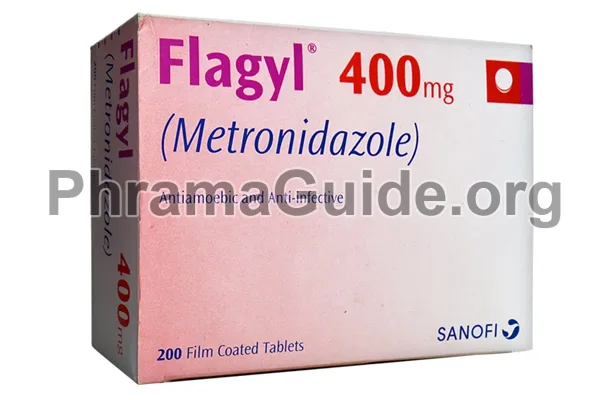Flagyl is an antibiotic medication commonly used to treat various bacterial and parasitic infections. Like any medication, it can have side effects. Not everyone will experience these side effects, and they can range from mild to severe. It’s important to note that if you experience any severe or unusual side effects while taking Flagyl, you should contact your healthcare provider immediately.
Common Side Effects Associated with Flagyl
- Gastrointestinal Disturbances: These are some of the most common side effects and can include Nausea, Vomiting, Diarrhea, and Abdominal cramping. Taking the medication with food or milk may help reduce these symptoms.
- Metallic Taste: Some people report a metallic or bitter taste in their mouth while taking Flagyl. This side effect usually goes away once the medication is discontinued.
- Headache: Headaches can occur while taking Flagyl.
- Dry Mouth: You may experience a dry or unpleasant taste in your mouth.
- Darkening of Urine: Flagyl can sometimes cause urine to darken, which is generally harmless.
- Vaginal Yeast Infections: Some women may develop vaginal yeast infections while taking Flagyl.
- Allergic Reactions: Although rare, some people may experience allergic reactions, such as Skin rash, Itching, Swelling of the Face or Throat, Severe Dizziness, or Difficulty Breathing. Seek immediate medical attention if you experience any of these symptoms.
- Neurological Symptoms: In rare cases, Flagyl may cause neurological symptoms such as Numbness or Tingling in the extremities, Seizures, or Confusion. If you experience any of these symptoms, contact your healthcare provider right away.
- Peripheral Neuropathy: This is a rare but serious side effect that can cause Numbness, Tingling, or Pain in the hands and feet. It is more likely to occur with prolonged use of Flagyl.
- Blood Disorders: In very rare cases, Flagyl can affect blood cells and lead to disorders like Agranulocytosis (a severe reduction in white blood cells), Thrombocytopenia (low platelet count), or Hemolytic anemia (destruction of red blood cells).
- Liver Problems: Liver problems are rare but have been reported in some individuals taking Flagyl. Symptoms may include Jaundice (yellowing of the skin and eyes) and Dark Urine.

What is Flagyl?
Flagyl is one of the leading brands of Metronidazole, manufactured and marketed by Sanofi Aventis (Pakistan) Ltd.
Flagyl: Available Formulations and Strengths
Presently, Flagyl is available in Tablets, Syrup, and Infusion forms.
Flagyl Tablet : 200mg and 400mg strengths.
Flagyl Syrup (60ml) : 200mg/5ml strength.
Flagyl Infusion : 500mg/100ml strength.
What Are The Possible Drug Interactions of Flagyl?
Alcohol: One of the most well-known interactions is with alcohol. Consuming alcohol while taking Flagyl can cause a severe reaction, including Nausea, Vomiting, Headache, Rapid Heartbeat, and Flushing. This reaction can persist for several hours, so it’s important to avoid alcohol during treatment with Flagyl and for at least 48 hours after completing the course of the medication.
Anticoagulants (Blood Thinners): Flagyl may enhance the effects of anticoagulants like Warfarin, potentially increasing the risk of bleeding. Your healthcare provider may need to monitor your blood clotting time more closely if you are taking both medications.
Lithium: Flagyl can increase lithium levels in the blood, potentially leading to lithium toxicity. Your lithium levels may need to be monitored more closely if you are prescribed both medications.
Phenytoin and Phenobarbital: Flagyl may increase the blood levels of these medications, potentially leading to an increased risk of side effects. Dose adjustments may be necessary.
Cyclosporine: Flagyl may increase the blood levels of cyclosporine, a medication used to suppress the immune system in transplant patients. This interaction can lead to an increased risk of cyclosporine toxicity.
Disulfiram: Disulfiram is a medication used to treat alcohol dependence by causing unpleasant effects when alcohol is consumed. Combining Flagyl with disulfiram can lead to an increased risk of disulfiram-like reactions when even small amounts of alcohol are consumed.
Antifungal Medications: Some antifungal medications, such as Ketoconazole and Fluconazole, may interact with Flagyl leading to an increased risk of side effects.
Certain Seizure Medications: There have been reports of seizures occurring in individuals taking Flagyl along with certain seizure medications. Close monitoring may be necessary.
Oral Anticoagulants: Flagylcan interacts with certain oral anticoagulants, potentially increasing the risk of bleeding. Regular monitoring of blood clotting time is important in such cases.
Busulfan: Flagylcan increases blood levels of busulfan, a medication used in certain cancer treatments. This interaction can lead to an increased risk of busulfan toxicity.
Related Links :

Leave A Comment